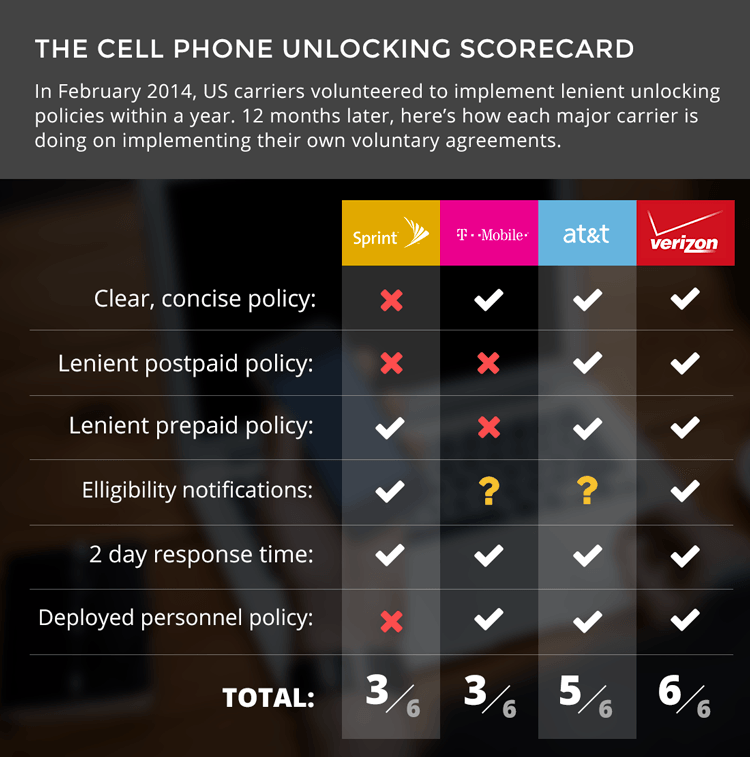Last year, all four of the main carriers promised the FCC that they would voluntarily change their unlocking policies to become more user friendly. The FCC outlined six guidelines that all carriers were supposed to follow including:
 Sprint was cited as being the worst of the four (which shouldn’t surprise anyone, really) as they not only have a harder-to-find unlocking policy that isn’t as lenient as it probably should be, but they also reportedly “give customers trouble in connecting devices from other carriers.” T-Mobile limits the number of unlocks someone can request in a 12 month period, and neither T-Mobile or AT&T have a clear definition of whether they will notify customers or not. Yesterday, Sprint and T-Mobile refuted the independent study, claiming that they actually DID meet all six requirements, but I’m not sure I’m convinced.
We published an article last week going over the new unlocking policies, which you can take a look at yourself here. Personally, I can’t say I’m super surprised at the lack of follow-through, but what the original article I read misses, is that it’s clearly a step in the right direction. Now if we can just make it permanent instead of a voluntary thing…]]>
Sprint was cited as being the worst of the four (which shouldn’t surprise anyone, really) as they not only have a harder-to-find unlocking policy that isn’t as lenient as it probably should be, but they also reportedly “give customers trouble in connecting devices from other carriers.” T-Mobile limits the number of unlocks someone can request in a 12 month period, and neither T-Mobile or AT&T have a clear definition of whether they will notify customers or not. Yesterday, Sprint and T-Mobile refuted the independent study, claiming that they actually DID meet all six requirements, but I’m not sure I’m convinced.
We published an article last week going over the new unlocking policies, which you can take a look at yourself here. Personally, I can’t say I’m super surprised at the lack of follow-through, but what the original article I read misses, is that it’s clearly a step in the right direction. Now if we can just make it permanent instead of a voluntary thing…]]>
- Implement prepaid unlocking policies
- Implement postpaid unlocking policies
- Offer unlocked devices to active, overseas service members
- Post clear and concise unlocking policies
- Respond to unlock requests within 2 business days
- Notify customers when phones are eligible to be unlocked
 Sprint was cited as being the worst of the four (which shouldn’t surprise anyone, really) as they not only have a harder-to-find unlocking policy that isn’t as lenient as it probably should be, but they also reportedly “give customers trouble in connecting devices from other carriers.” T-Mobile limits the number of unlocks someone can request in a 12 month period, and neither T-Mobile or AT&T have a clear definition of whether they will notify customers or not. Yesterday, Sprint and T-Mobile refuted the independent study, claiming that they actually DID meet all six requirements, but I’m not sure I’m convinced.
We published an article last week going over the new unlocking policies, which you can take a look at yourself here. Personally, I can’t say I’m super surprised at the lack of follow-through, but what the original article I read misses, is that it’s clearly a step in the right direction. Now if we can just make it permanent instead of a voluntary thing…]]>
Sprint was cited as being the worst of the four (which shouldn’t surprise anyone, really) as they not only have a harder-to-find unlocking policy that isn’t as lenient as it probably should be, but they also reportedly “give customers trouble in connecting devices from other carriers.” T-Mobile limits the number of unlocks someone can request in a 12 month period, and neither T-Mobile or AT&T have a clear definition of whether they will notify customers or not. Yesterday, Sprint and T-Mobile refuted the independent study, claiming that they actually DID meet all six requirements, but I’m not sure I’m convinced.
We published an article last week going over the new unlocking policies, which you can take a look at yourself here. Personally, I can’t say I’m super surprised at the lack of follow-through, but what the original article I read misses, is that it’s clearly a step in the right direction. Now if we can just make it permanent instead of a voluntary thing…]]>
Posted in News

